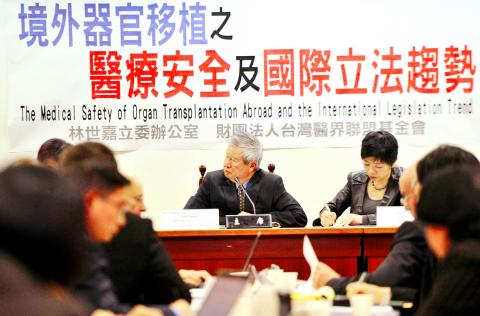To build a fair and ethical transplant environment, Democratic Progressive Party Legislator Tien Chiu-chin (田秋堇) yesterday said she aimed to propose clearer legislation on overseas organ transplants and tighter regulations on post-transplant care covered by National Health Insurance (NHI) for those who traveled abroad for the transplants.
Tien made the remark at a round-table discussion hosted by the Taiwan International Care Association for Organ Transplants and the Department of Health that was attended by experts and lawmakers.
Two issues surrounding organ transplants in Taiwan were spotlighted by foreign experts and Taiwanese legislators: using executed prisoners as organ donors and post-transplant medication insured by the NHI.

Photo: Chen Chih-chu, Taipei Times
Jacob Lavee, director of the heart transplant unit at Israel’s Sheba Medical Center, said he used to hold up Taiwan on various occasions as a prominent example of a nation that had stopped taking organs from executed prisoners, who are considered unwilling donors, until he regretfully discovered Taiwan had resumed using such organs two years ago.
The Department of Health’s Bureau of Planning head Shih Chung-yuan (石崇原) said in response that “although there is no law banning the use of organs taken from executed prisoners, the government does not encourage it and has stopped soliciting organ donations in the prison.”
Concerning the current lawless state of organ transplants performed abroad, Shih said that in 2009, an amendment to the Organ Transplant Act (人體器官移植條例) was proposed that would require all organ recipients, in Taiwan or abroad, to register with local authorities, but it was not passed.
Tien also called for stricter regulation for organ transplants performed abroad, saying that since the majority (88.6 percent) of Taiwanese organ recipients went to China for organ transplants that are often from questionable and unethical organ sources, but continue to be insured by the NHI for post-transplant medication, “it almost seems like all Taiwanese who contribute to the NHI are complicit with the illegal and unethical organ-harvesting crimes perpetrated in China.”

A preclearance service to facilitate entry for people traveling to select airports in Japan would be available from Thursday next week to Feb. 25 at Taiwan Taoyuan International Airport, Taoyuan International Airport Corp (TIAC) said on Tuesday. The service was first made available to Taiwanese travelers throughout the winter vacation of 2024 and during the Lunar New Year holiday. In addition to flights to the Japanese cities of Hakodate, Asahikawa, Akita, Sendai, Niigata, Okayama, Takamatsu, Kumamoto and Kagoshima, the service would be available to travelers to Kobe and Oita. The service can be accessed by passengers of 15 flight routes operated by

Alain Robert, known as the "French Spider-Man," praised Alex Honnold as exceptionally well-prepared after the US climber completed a free solo ascent of Taipei 101 yesterday. Robert said Honnold's ascent of the 508m-tall skyscraper in just more than one-and-a-half hours without using safety ropes or equipment was a remarkable achievement. "This is my life," he said in an interview conducted in French, adding that he liked the feeling of being "on the edge of danger." The 63-year-old Frenchman climbed Taipei 101 using ropes in December 2004, taking about four hours to reach the top. On a one-to-10 scale of difficulty, Robert said Taipei 101

Taiwanese and US defense groups are collaborating to introduce deployable, semi-autonomous manufacturing systems for drones and components in a boost to the nation’s supply chain resilience. Taiwan’s G-Tech Optroelectronics Corp subsidiary GTOC and the US’ Aerkomm Inc on Friday announced an agreement with fellow US-based Firestorm Lab to adopt the latter’s xCell, a technology featuring 3D printers fitted in 6.1m container units. The systems enable aerial platforms and parts to be produced in high volumes from dispersed nodes capable of rapid redeployment, to minimize the risk of enemy strikes and to meet field requirements, they said. Firestorm chief technology officer Ian Muceus said

MORE FALL: An investigation into one of Xi’s key cronies, part of a broader ‘anti-corruption’ drive, indicates that he might have a deep distrust in the military, an expert said China’s latest military purge underscores systemic risks in its shift from collective leadership to sole rule under Chinese President Xi Jinping (習近平), and could disrupt its chain of command and military capabilities, a national security official said yesterday. If decisionmaking within the Chinese Communist Party has become “irrational” under one-man rule, the Taiwan Strait and the regional situation must be approached with extreme caution, given unforeseen risks, they added. The anonymous official made the remarks as China’s Central Military Commission Vice Chairman Zhang Youxia (張又俠) and Joint Staff Department Chief of Staff Liu Zhenli (劉振立) were reportedly being investigated for suspected “serious